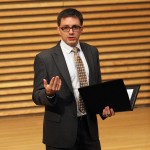For university educators, the American orchestra provides a way to illuminate social, economic, and cultural issues at the center of American culture.
The repertoire preserved in classical music’s notated scores reaches far into the past, but the process of bringing it to life involves large-scale, labor-intensive, and highly specialized educational processes, institutional structures, and economic relationships. Throughout American history, orchestras have proved to be powerful players in their communities through performances, fundraising, and educational activities that involve thousands of people. Further, many classical music institutions also commission and present new music by contemporary composers that can, and do, highlight or comment upon contemporary events or social practice. As a result, activities by the country’s orchestras offer a window onto the particular history and culture of an individual community; but more broadly onto shared efforts to shape American urban life and American society.
The conversations archived on this website cover topics such as access, diversity, education, history, innovation, media, and participation.
Music for City, Music for the World: 100 Years with the San Francisco Symphony, by Larry Rothe
American Orchestras in the Nineteenth Century, edited by John Spitzer
Music and Politics in San Francisco: From the 1906 Quake to the Second World War, by Leta E. Miller
The Great American Symphony Orchestra: A Behind the Scenes Look at its Artistry, Passion and Heartache by Anthony J. Cirone
Digital archives offer primary sources related to orchestras:
New York Philharmonic archives
Chicago Symphony Orchestra archives
American Memory collection at the Library of Congress
Educators at all levels can explore the resources on this site by theme (Community, Creativity, Audience) or by tags. Additional suggestions and resources can be found on the pages for primary educators and secondary educators.


